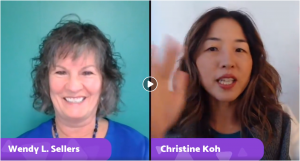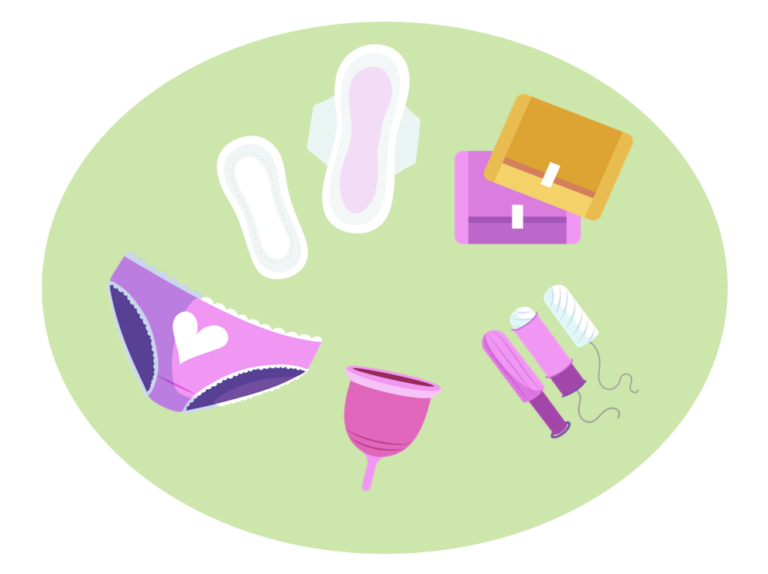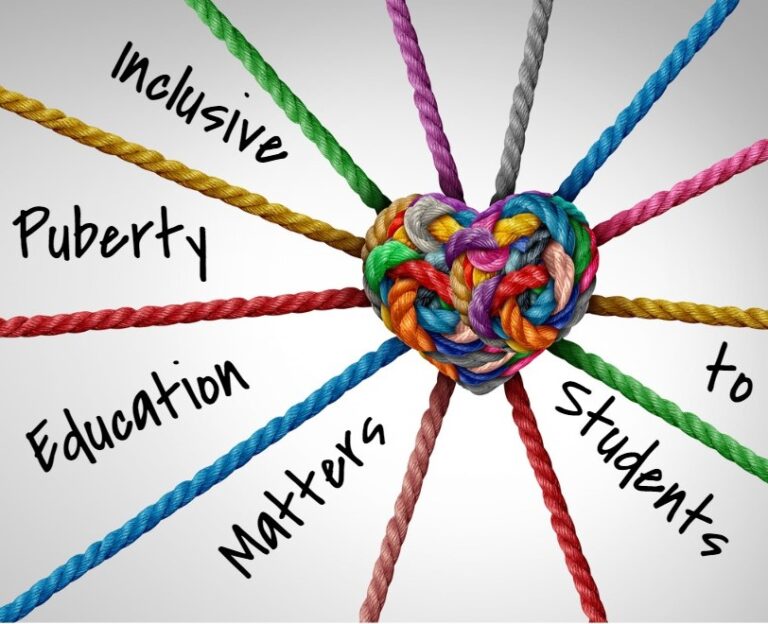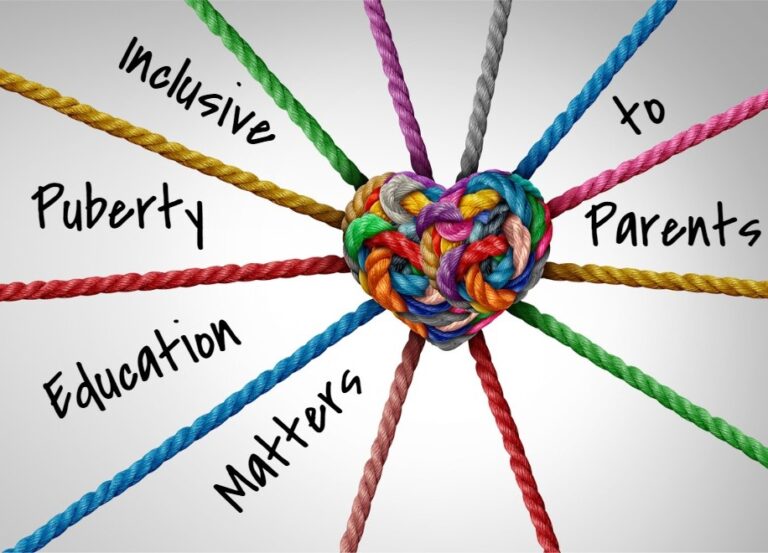Let’s Talk About Consent
Amaze Parents asked The Puberty Lady for an interview to talk about ways parents and other trusted adults can talk to their younger children about consent without bringing up the topic of sex. You can watch the interview or read the transcript below. Christine Koh interviewed Wendy L. Sellers on Facebook Live October 19, 2018.

Christine Koh: Hello everyone and welcome to Amaze Live. It’s been a few weeks since we’ve done one of these, and we are excited to be back. And I’m so delighted to be joined by educator Wendy Sellers. Hi Wendy!
Wendy Sellers: Hi Christine. How are you?
CK: Good. How are you? I’m so excited to be here! You have this perfect, pretty, backdrop, I don’t know what that’s all about.
WS: Well, I had this wall in my office, and I decided to paint it, and I wanted a vibrant, energizing color so I am glad you like it.
CK: I love it! It’s awesome. I have a room in my house that is bright yellow on one wall, and I think that energy is a good thing. So, I am so excited to talk to you. You are what some people call the “Puberty Lady.” You’re an educator and sex ed educators are, like, my heroes in life so I am just delighted to talk with you. And I was wondering if we could start by you talking about your path to becoming an educator.
WS: Sure, I’d be happy to… and thanks for having me on and for having this chat. I think it’s important that those of us who think those who are sex educators are heroes do have opportunities to talk with others so thank you for that.
I am a registered nurse, and when I was growing up I had a pretty terrible sex education… so I went to nursing school, I learned a lot, and I was working with patients in the hospital, and I realized that they did not know anything about their bodies or how to take care of them, and then they ended up in the hospital needing to be fixed. So, I decided I needed to focus on meeting people upstream a little and helping them to stay healthy, so I went into health education consulting and at the same time I started having my own kids, and I wanted them to have a better sex education than I had. I believe that includes a great sex education at home with family, and a great sex education at school with other trusted adults and peers. So, they went to school, and their school wasn’t teaching any sex education. I volunteered to teach the lessons at the school before my kids got to those grades, at that time it was 5th grade when we started. And I thought “well, I’ll teach these lessons and the teachers see me modeling this and then they will take on the responsibility of teaching the lessons by the time my kids reach 5th grade.” That didn’t happen. So, I not only ended up teaching the kids ahead of my kids, but also my kids and their friends… and that’s how I got the name the “Puberty Lady.”
CK: Okay, so hold on. So how did your kids feel about this?
WS: As you can imagine, they had mixed feelings about it. They were a little embarrassed because their friends would say “oh, your mom is the Puberty Lady?” On the other, I think they had this little sense of pride and esteem that their friends were getting all this great information from their mom and that their friends’ parents didn’t necessarily provide that kind information for them, and it was of great interest and relevance, of course, but there were definitely mixed feelings.
Funny story: My children’s friends grew up and got married, and I got lots of invitations to weddings. One of them introduced me to his new bride as the woman who taught him everything he knows about sex.
CK: I love it! I think that should go on your resume or something.
I want to take a second as people are coming into the broadcast. Wendy, I don’t know if you’ve done one of these before, some watch now and others come in later. If you’re here, please feel free to drop a comment or if you have a question, she is the expert. If something is on your mind, let us know or if you’re coming into it later, leave your comments or questions in the comment box and we will get back to them.
Um, that is amazing.
I actually have a fourteen-year-old and a seven-year-old. I’m not a formal educator. I work with Amaze, but I’m not in your space. The running joke with my fourteen-year-old and her friends is I’ll be like “hey does anyone need a trusted adult? I’ll be your trusted adult.” And I’ve been going #TrustedAdult. And I think they’re both, I think, a little like your kids, a little horrified, but also a little entertained by the whole thing.
WS: Good for you because kids do need trusted adults. The research shows that when kids have a trusted adult, either a parent or someone like you, who’s willing to be honest and supportive of them that it protects them from engaging in risk behavior, so good for you! You are doing your part to help young people.
CK: Like I said, educators are my heroes and in my next life, I kind of want to come back as one.
But anyway, obviously there is a lot in the news right now. I was really interested to talk to you and I know you have all sorts of curriculum, and I’m going to link your website later so people can see the amazing stuff that you do.
What I’ve been hearing from a lot of parents is about is how to talk to kids about what is going on. How to talk about sexual harassment and consent, and especially for kids who are younger because at Amaze we’re often talking about how it’s important to have these conversations early and often but it can feel really hard. So I would love to hear your thoughts on how to use some of these headlines as a teachable moment and maybe one of your top tips for how to get started with that.
WS: Yes, great. the headlines are creating a lot of teachable moments, moments that we can use to create discussions with our children and the challenge is figuring out how to do that in an age-appropriate, developmentally appropriate way. The parents I talk to and hear from are really wanting to have meaningful conversations with their kids about the headlines, about harassment, and don’t really know how because most adults didn’t have good models. Their own parents probably didn’t do a real good job and often times we try to replicate what our own parents did when we parent our children. In the absence of those kinds of models and with the headlines that we are seeing now, parents are a little anxious, and I think that is real normal. I like to remind parents that children are like mechanics – they just like to know how things work – so keep any explanation or discussion at a very simple, short level and then their children can ask for more information if they want it. For example, one good way to start is from birth, teaching kids the proper terms for body parts and not teaching kids euphemisms or cutesy names for body parts. The mere fact that we give nicknames to body parts is, in a way, part of shaming and the stigma about talking about our reproductive systems and bodies, but it can also be a very disrespectful way to refer to our bodies and that can carry over into relationships later.
CK: Mmhmm. I absolutely agree and later on today I want to share a CNN article from CNN showed some examples of ways to talk to 8- to 9-year-olds about consent. Could you give some examples of language or situations, like what would be for one kid, a way to bring consent into a conversation about their daily lives?
WS: Sure. Let’s say you’re traveling down the road and the radio’s on and there’s a headline about the Kavanaugh hearing or some other #MeToo event that’s going on right now. You could simply say, “Have you heard about this news piece before? It’s related to people not treating each other with respect and one form of that is called sexual harassment, and I’d really like to talk to you a little about that.” And then you can talk about consent is, first of all, asking for permission before borrowing a possession or getting into someone’s body space. You don’t even have to talk about sex. It’s really learning how to build respectful relationships. So I would start with younger kids with possessions. I have eight grandchildren, ages 9 on down, and so I’ve been seeing a lot of things about not respecting possessions, just like all children. Simply teaching them that if you have a possession and someone would like to use that possession, what would you like them to do? Of course, you would like them to ask for permission. And if you want to borrow someone’s toy or pencil or art supply, what would you do before you just grabbed it? Of course, you would ask first. That’s call consent. You ask for consent and the other person can say “yes” or “no,” and that is called giving consent or not giving consent. So it has nothing to do with sex at first.
CK: I love that example because isn’t all of childhood about consent around “stuff”? I think that Is perfect. Another one that comes to mind too because I have two kids and my older one was very affectionate and my younger one was very withholding as a toddler and so we realized pretty early that she really didn’t want to hug everybody. So we would say, and my family is very “huggy” so they would find this very weird, but we would say, “you can give a hug or a high five and either one is fine.” I think that is another form of consent, correct?
WS: Absolutely! That’s the next layer. When children are in a situation where a family member wants to hug them or kiss them or whatever, it’s really important that we always honor the child’s right to their own body. So, the second message after possessions would be that you have the right to your own body space: it belongs to you. If somebody gets too close or they touch you and you don’t like or want that, you can say “stop” or “no.” If the person doesn’t respect your “no” or your “stop,” you need to get away and tell a trusted adult. And turn that around. Other people also have their own body space, and if you want to get close to someone or touch someone, it’s important to ask first so you can see if that person wants you to get close or touch them. If they say yes, great. You can give them a hug or tickle them or whatever, but if they say no, you just back away and find another way to show your affection or interest in them.
CK: I think that’s an awesome point because I feel like that actually weaves right into teaching kids to be empathetic and tuned in and to pay attention to what other people are feeling. So I think that’s really a great point. I’d like to just take that a step further. I think a lot of parents, and I know I felt a little of this when my Violet didn’t want to hug people, is that feeling that “oh, other parents are going to be judging me.” What do you say to people, just get over it or some kind of framing that would help parents feel okay helping their kids put up those boundaries.
WS: Yes, as parents and grandparents that can feel very awkward. I think it’s a generational thing also. Back in the day, we didn’t have any choice but to get smooched by great aunt Adelpha, and we’d never met her before, right? So when our children establish a boundary and don’t want to be touched or kissed or hugged, I think it’s great to say, “we’re teaching my child how to say yes or no to people getting into their boundaries. And so, if she doesn’t or he doesn’t want to be touched or hugged right now, it really isn’t about you, they just don’t want that right now, and we really think that is going to protect them now and in the future when people want to get into their body space without their consent.” I have had to have a talk with my own mom about this. She is a great-grandma, and she thinks that all of the great-grandchildren should just rush into her arms and welcome her hugs, but they each have their own personalities, and they have had different amounts of time with Great-Grandma and may feel comfortable or not. Have a conversation with those folks offline just to help them understand that in this day and age of #MeToo, we want to do better by the next generation than what we were taught.
CK: I think that is so, very astute. A lot of parents are very overwhelmed, we’ve talked about that. I think there is a lot of concern about “I don’t have all the words or I’m worried I’m not going to get this right or perfect or whatever.” What would you say to parents ease them into a space of comfort or just kind of letting go and having these conversations?
WS: Absolutely. I think all of us are uncomfortable with that, and a lot of that has to do with us. We have our adult baggage and our adult experiences and history, and we are afraid we will say the wrong thing. The good news is that saying something is better than saying nothing… always. And it’s not a one-shot deal. You have many, many chances to have ongoing conversations with your children about these topics because there will be teachable moments that come up. And if they don’t come up, please create those moments. I encourage parents to watch a tv show together, and if you see a situation where there is disrespectful behavior, pause the tv show and say, “did you notice that? What did you think about that? How do you think that person felt when that happened?” Just chat with them about it. Parents also have a set of values. I like to remind people that when they talk to their children and answer their questions, have in mind what is the value you really want to emphasize at that particular moment? Most parents want to emphasize safety and health and respect. If you keep thinking about “what is the message I can talk about and emphasize briefly, in this moment, that has to do with my message about safety, health, and respect?” then, over time, it will get easier because you’re focused on those values that you want your child to learn.
CK: I think it can be, I think one of the things I picked up from Nora Gelperin, who introduced us actually, is that it’s okay to not have the answers, and it can be a really good moment to say “you know, I’m not really sure. I’m going to look that up or let’s look that up together.” We have a question from somebody, I’m going to pop it up, but I have a feeling it’s going to obliterate your face so if it does, I’ll take it down.
This is from Tammy. Tammy, thanks for writing. She says “I’d like to role-play with my 12-year-old daughter about how to enforce a boundary. She looks older than her age, and I suspect she’ll soon have boys who put their hands on her or try to kiss her. I want to practice with her on how to say no and get comfortable with attempts at minimizing her thoughts and/or courage after her boundaries have not been respected.”
So her question is what is the best way to start this conversation and kind of the flow of it. She also says I also have a 13-year-old boy and another 10-year-old so all of this will become more important soon.
So just to recap because that was a lot of words… She has a 12-year-old and wants to help her enforce boundaries, and I suspect doesn’t want to totally freak her out, so what would be your recommendations to help her get started?
WS: First of all, good for you for wanting to do that and role-play is a very powerful tool. When young people role-play a situation, they get to practice responses and find out what works best for them. And the more they practice those responses, the more likely they are to be able to use them in a real crisis situation. Good for you Mom! I suggest that maybe you create a little skit card and say, “Okay, here is a situation. Let’s practice what you would do in that situation.” And maybe you each do one so you create a couple of situations involving unwanted touch, and it could be something from Mom’s past. But you don’t need to share anything from your past. But most adult women have had experiences where they have been sexually harassed or experienced unwanted touch. And so, if you are able to kind of create a situation and say, “okay you tell me if what I say is clear and sounds strong, and then I’m going to ask you if there’s something else I could have said that would have made me sound stronger.” And so you each take turns doing that. And so the mom could model first saying “Stop touching me that way. I don’t want you to do that. Stop touching me. I will report you. Stop touching me. I’m going to tell an adult.” Making those kinds of statements, and then give the daughter a chance to give her feedback, if she’s willing to. And then, let the daughter practice with a different situation.
CK: I think that’s really good, and I loved the examples you gave of what to say because I think the language can just be really simple like that. I’m a wordy person, so I tend to think of a dialogue but I think it can just be really simple statements like that and they can be really effective. I think that’s really good.
What do you think also about because I’m just trying to get into the feeling space of this mom and do you think it’s helpful to talk through with your kid, “Okay what is your day like? Where do you think of this kind of thing would happen? Would it be around friends?” Is that useful to do?
WS: Yes. It’s always useful to talk to children. “What was your day like? What were some highlights? What were some challenges?” Is there anything they want to talk through or anything that gave them an “uh oh” feeling inside? And I think it’s very valuable for the mom to talk with her daughter about, “Gosh, you’re growing up. I notice you’re having some changes in appearance. Have your classmates made any comments about how mature you’re getting? Because sometimes your classmates may be curious about that, especially if they aren’t developing yet and you are. And I just wondered how that was going for you.” Just talking about if someone is developing earlier than other students they do tend to get some unwanted attention… and it may help her to be able to talk about that.
CK: That’s awesome and she, Tammy, says, “skit cards with me leading the modeling, so good! Thank you.”
One of the last questions I wanted ask you is we’ve heard a lot of concern from parents of sons that it’s scary right now. It’s easy to think “my kid would never do that,” but then it’s easy to think “my kid would do that or do something unintentional.” So do you have any top tips for how parents can talk to sons in a way that doesn’t create a freak out situation and maybe, like you’ve done through this broadcast, with some actual language for how to get that started.
WS: Sure. I think before we talk to our sons, it’s good for parents to do a little work themselves and to kind of do some reading. It’s easy to Google sexual harassment, sex role, expectations, stereotypes… and do some work yourself to understand how much you already know about sexual harassment.
Someone mentioned they needed to look up something. I did some reading before I did this broadcast with you because I wanted to make sure I was current on things, and I came across a study, and I’ll give you the link so you can post it. It was a study on how aware men are when it comes to sexual harassment and it really indicated that most adult males don’t recognize what sexual harassment is and, um, they think all of the conversation is a bit of overkill, which to me indicates that adults need to do some work. Men and women have been so immersed in a culture that promotes sexism and sexual harassment and sexual assault and what some call “rape culture” that we don’t necessarily recognize it ourselves. So that is step one. Step two would be to do a dive into your son’s world. Share some of his activities, share some of his tv shows, share his video games. And with heightened awareness, look for things in that media and in his world that illustrate sexual harassment and disrespectful relationships, especially with women or girls. Because when you take the blinders off, and you’re looking for those things, you see that our sons are swimming in a pool that really encourages them to be sexist, to be dominant, and to objectify girls and women. Once you immerse yourself in your son’s world and have that awareness of what you’re looking for, then you can stop that action and say, “Oh my goodness! Look at that video game! Did you just earn two points for running over a woman? What does that mean? What would happen in real life? How do women feel about the fact that people get points in a video game for running them over?” And they’re likely to say, “oh, Mom, it’s just pretend,” but we need to raise their sensitivity and awareness to what is going on around them also.
CK: I think that is amazing and really, really helpful. So my last question is, you said you’re going to send me the link to the study, but are there any other resources you recommend for these kinds of conversations or any sex ed resources?
WS: There are some great books out there on how to understand your sons better, specifically how they are raised to be masculine and what society expects from them and how to raise sons that are more aware and less likely to be the kind of man that would commit sexual harassment or assault. So I will be happy to put together a book list so that you can post that. Another book that I think is really interesting… I was in a workshop with Emily Nagoski who wrote a book called Come As You Are, and it’s about female sexuality. And the reason I bring it up is that one of her points is that we often teach people that sex is a need, and sex is not a need. No one dies without it, even though some people might think they’re going to. It’s not like air and food and water. But it is a strong drive and highly rewarded by the brain. But when we teach boys that sex is a need, we are more likely to excuse bad behavior. She used the illustration of two people stealing. One person stole a loaf of bread because their children were starving. The other person stole jewelry from a high-end shop, but even though they had the money in their purse to pay for it, they stole it anyway. Which of those two people are we more likely to excuse for stealing? The person who needed the bread to feed their children, right? When we portray sex as a need, we are more likely to excuse men for taking what they “need,” and that results in sexual assault. So I just thought her book had some really interesting shifts in how we view sexuality and interactions.
CK: Wow! That’s…. I’ve never heard that comparison and that’s really interesting.
Well, Wendy, this has been such a pleasure. And I thank you so much for being with us today. Is there anything I missed or anything else you would like to bring up?
WS: No, thank you, Christine, for hosting this and for all of the work you are doing. And if people have additional questions, I’d be happy to respond afterwards.
CK: Awesome. Thank you so much and thank you, folks, for joining us. And if you’re watching later, feel free to drop your questions for Wendy in the comments.
Amaze.org seeks to equip parents with tools to have conversations with their children about puberty, relationships, and sex. They create fun, honest videos to help teens + tweens make sense of sex, relationships + growing up.



